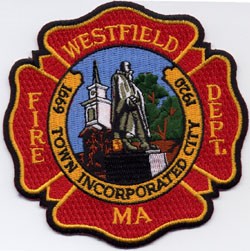Westfield News reporter Dan Desrochers also contributed to this story.
WESTFIELD/SOUTHWICK– With temperatures continuing to drop this winter, it is important for people to be aware of the dangers that can occur in homes or businesses when not properly conducting certain measures.
Frozen pipes can be a detriment to your home, business and your life. In addition to damage and flooding, the problem costs money to repair and can dampen the holidays. The Westfield and Southwick Fire Departments, as well as the State Fire Marshal’s office, have given tips to residents to help prevent the costly mishap.
“This bitter cold weather brings the risk of frozen pipes,” said Massachusetts State Fire Marshal Peter J. Ostroskey. “As difficult as that situation is, it is important not to make a bad situation worse; many people cause fires trying to thaw frozen pipes.”
Locally, Westfield Fire Deputy Chief Eric Bishop and Southwick Fire Chief Russ Anderson, talked about some of the same prevention tips.
According to Bishop, there were 39 water-related emergencies in Westfield so far in 2016. Twenty-one of those incidents were broken pipe incidents and of those 21 incidents, 19 happened between Feb. 14 and Feb. 16 of 2016. The other two incidents occurred last week.
 According to Anderson, an inexperienced individual thawing frozen pipes is a common way for fires to be started.
According to Anderson, an inexperienced individual thawing frozen pipes is a common way for fires to be started.
“People using torches to thaw the pipes and catching other parts of the building on fire,” said Anderson. “That’s where a lot of the caution comes in.”
A key piece of information to frozen pipes is the fact that as water becomes frozen, it expands in size. Eventually, it can grow as much as 9 percent in size, which causes the fracture of the piping.
In the press release from the Department of Fire Services, it states what you should and shouldn’t do when trying to thaw the pipes.
“Apply heat to the section of pipe using an electric heating pad wrapped around the pipe, an electric hair-dryer, or wrapping pipes with towels soaked in hot water. Do not use a blowtorch, kerosene or propane heater, charcoal stove, or other open flame devices. A blowtorch can make water in a frozen pipe boil and cause the pipe to explode. All open flames in homes present a serious fire danger.
In addition to thawing pipes, Bishop urges people to be aware of where they are located.
“The pipes that are most susceptible are found along exterior walls or that are exposed,” said Bishop.
Anderson pointed out that people who are leaving for vacation during the holiday season should never leave their water on for a long of a period.
“That water is going to continue to run as long as it has a source,” said Anderson. “It can cause a lot of damage.”
Bishop echoed Anderson’s statement about what water damage can evolve to.
“Water will end up in the basements, but flooding can actually happen anywhere in the home,” said Bishop.
Putting space heaters near the frozen pipes is certainly a fire hazard and Anderson strongly suggests the 3-foot rule to residences or businesses. A space heater shouldn’t be within 3 feet of a pipe, and this certainly applies for any frozen pipes since there is a risk of the heat source falling over.
All three also mentioned that leaving a water source trickling can help prevent the freezing of pipes.
Still relatively early into the winter season, extremely cold temperatures can be expected in the near future. The prevention tips are important to both fire departments, and they want to assure the community just how vital it is.
“An ounce of prevention, prevents a headache later on,” said Bishop.
If there are any questions or thoughts regarding concerns or prevention tips about frozen pipes, Anderson can be contacted at 413-569-6363. Bishop can be reached at 413-572-6330.



